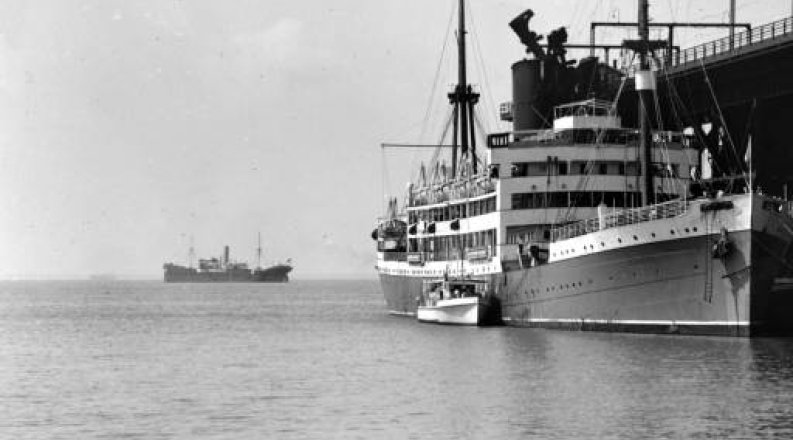By Annette Finley-Croswhite
In 2005, the United Nations designated Jan. 27 as International Holocaust Remembrance Day to honor the 6 million Jews and millions of other victims killed during the Holocaust and other genocides.
Old Dominion University will recognize this day by retelling the story of the SS Quanza, a passenger ship that brought Jewish refugees to Norfolk during World War II. The University will host a screening of the documentary film “Nobody Wants Us” at 5:30 p.m. on Feb. 15 at the University Theatre.
After the film, the following panel of speakers will address the film to the audience:
- Laura Seltzer-Duny, producer and director for “Nobody Wants Us” and an award-winning PBS documentary filmmaker.
- Eric Mazur, professor of religious studies, Gloria and David Furman Endowed Professorship and Fellow of the Robert Nusbaum Center at Virginia Wesleyan University.
- Stephanie Hawthorne, alum of Institute for the Humanities at ODU (with a project on the Quanza) and financial manager of academic departments in the Strome College of Business.
The event is sponsored by ODU’s Institute for Jewish Studies and Interfaith Understanding, the Center for Faculty Development, the College of Arts and Letters, the Batten College of Engineering and Technology, the Strome College of Business, the University Libraries, the Department of History, the Maritime, Ports and Logistics Institute, the Annual Campus Theme Blue Connections and the Office of Maritime Initiatives.
The screening is tied to “Maritime History of the Holocaust,” a special course that’s part of ODU’s Blue Connections Annual Campus Theme, a multidisciplinary initiative to explore the crucial role oceans and waterways play in society and the global economy.
The SS Quanza was a passenger liner that set sail from Lisbon, Portugal on Aug. 9, 1940 with 317 passengers aboard. Many of these voyagers were Jewish, desperately fleeing antisemitism in Europe during the Nazi oppression. The Quanza was one of the last ships to leave Europe before Germany banned emigration in October 1940 and before the United States prohibited most refugees from entering the country. Other ships had already been turned away, including the SS St. Louis that was denied entry into the U.S. and returned to Europe in June 1939, after which 254 of its 937 passengers were killed in the Holocaust.
The Quanza called in at ports in New York and Veracruz, Mexico, where most of the passengers with valid visas disembarked; however, 88 were denied entry and when the ship docked in Norfolk on Sept. 11, 1940 to refuel, it was met by armed guards. The desperate passengers sent telegrams to anyone they thought could help them. One of those telegrams went to First Lady Eleanor Roosevelt who was sensitive to refugee issues and aware of what happened to the St. Louis. Jewish leaders throughout the nation advocated on behalf of the refugees. It was at this point that a local lawyer from Newport News became aware of the passengers’ plight.
Jacob Morewitz was a maritime lawyer well-versed in admiralty law. Many local attorneys filed habeas corpus petitions for the passengers on board, but they were quickly dismissed. Morewitz, however, took a different approach. He launched a libel suit against the ship’s owners alleging that they had fraudulently charged passengers for delivery to the U.S. while knowing they would be unable to disembark. Admiralty Case No. 6594 “Moritz Rand et. al. vs. Steamship Quanza” was eventually thrown out of court, but not before the ship was impounded for three days in Norfolk, giving Eleanor Roosevelt time to convince her husband and the U.S. State Department to act. The Quanza passengers were granted entry on Sept. 14, 1940. 81 disembarked and seven opted to return to Europe (numbers vary slightly in document sources).
The local Jewish community, particularly members of the National Council of Jewish Women (NCJW), also came to the passengers’ rescue. They arrived at the dock in their cars and drove the passengers to local hotels and to their own homes. Many members of Norfolk’s Ohef Sholom Temple welcomed the weary travelers, offering them hot meals and warm beds before they made their way to other destinations in the U.S. The archives at Ohef Sholom, as well as the Slover Library, house documents telling the Quanza story.
Unfortunately, the events surrounding the SS Quanza also roused antisemitic sentiment in the country and angered U.S. Assistant Secretary of State Breckinridge Long. He called the Quanza passengers “undesirables” and subsequently worked to deny entry to most refugees arriving in U.S. ports.
“In a world where antisemitism is again on the rise and immigration issues continue to make headlines, the story of the SS Quanza remains relevant,” said Annette Finley-Croswhite, director of the Center for Faculty Development at ODU and a professor of History at the University. “We are thrilled to welcome Laura Seltzer-Duny to Norfolk and to honor the story of the SS Quanza.”



